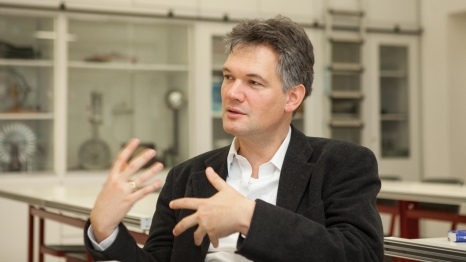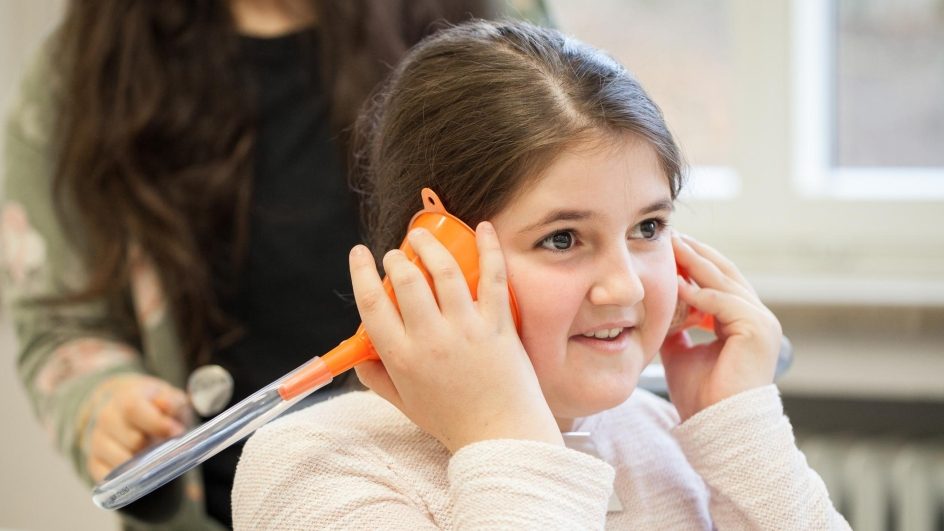
»The children had a lot of fun.«
Jörg Haas, Physics and Mathematics teacher
Jakob-Fugger-Gymnasium Augsburg
Jakob-Fugger-Gymnasium Augsburg
MINTegration – a STEM education project for transition classes
Starting a conversation while conducting an experiment: That is the goal of MINTegration, a science education workshop series for refugee children at Jakob Fugger Gymnasium in Augsburg, Germany. “MINT” means STEM education and refers to the subjects of math, information technology, natural sciences, and technology. Physics and mathematics teacher Jörg Haas broke new ground with his project, which can be used in all subjects at all school levels.
A STEM education project for refugee children - how did you come up with that idea?
Siemens Stiftung offered MINT-EC schools (German Association of Math and Science School Excellence Network) with help in integrating refugee children. At primary schools in Bavaria, these children receive intense German lessons in transition classes, but the sciences were hardly being taught at all. I just wanted to give the children the chance to explore science.
What role can science and technology education play in integrating refugees?
Our project’s goal is to use encounters with scientific phenomena to reinforce language learning. Beyond that, we wanted to introduce the refugee children to Jakob Fugger Gymnasium in Augsburg, an example of a secondary school where they can pursue their A-levels. Most of our tutors have immigration backgrounds of their own – for the primary school kids they were great role models of successful integration.
What were the workshops like?
The workshops were spread over four afternoons per transition class. First, we met in the cafeteria to have lunch together. Then we always started things off with a game – there were plenty of laughs right from the beginning. After that, it was time to experiment. At the end, the tutors helped the children record the results on worksheets.
What experiments did the children conduct?
We did experiments on the topics of the human body and senses, circuits and energy, and water and filtration. Those included things like the lemon battery, directional hearing, conductors and non-conductors, or filtering water. For the most part, the experiments came from Siemens Stiftung Experimento kits.
What kind of "language-sensitive" teaching materials were used?
For each experiment, we had a vocabulary sheet with photos and the corresponding technical terms in German. On each sheet the singular and plural forms of the words are listed, in addition to each word’s article, meaning the children could learn it all in one go. They were also tasked with writing a sentence using each word.
Was the project well-received by the students?
A lot of the primary school children had never come into contact with the experimental approach to science. They were surprised to see that a lemon could be used to light a lamp. The kids really liked that.
So you were able to awaken the children’s interest in science!
Definitely, we uncovered the joy of experimentation. We saw that the children were having fun and enjoyed coming back.
What have been some of your personal takeaways from the project?
There were around ten different languages represented in the project, some of which I didn’t know. Teaching “language-sensitive” lessons was also new to me. My personal highlight was seeing the tutors show such empathy when working with the children. They laughed together during the experiments and had a lot of fun. That was really touching.
Are you planning to take the project further?
In the second half of the year, we want to offer another series of workshops. Starting in September, a seminar is planned at the department of physics education at Universität Augsburg that sees the students take on the role of the teacher. The method is called “learning by teaching.”
Would you share your concept with anyone who was interested?
Of course! We are happy to share our concept with other schools. Editable versions of the materials are available that can be easily adapted. Anyone could get started right away!
April 2018
Links



